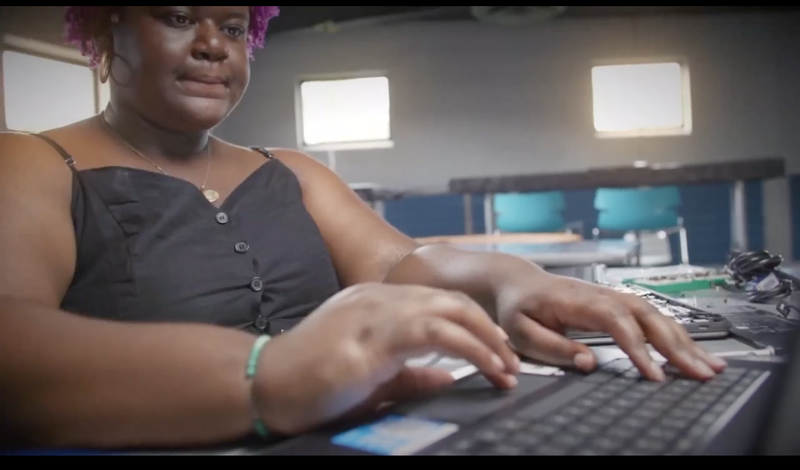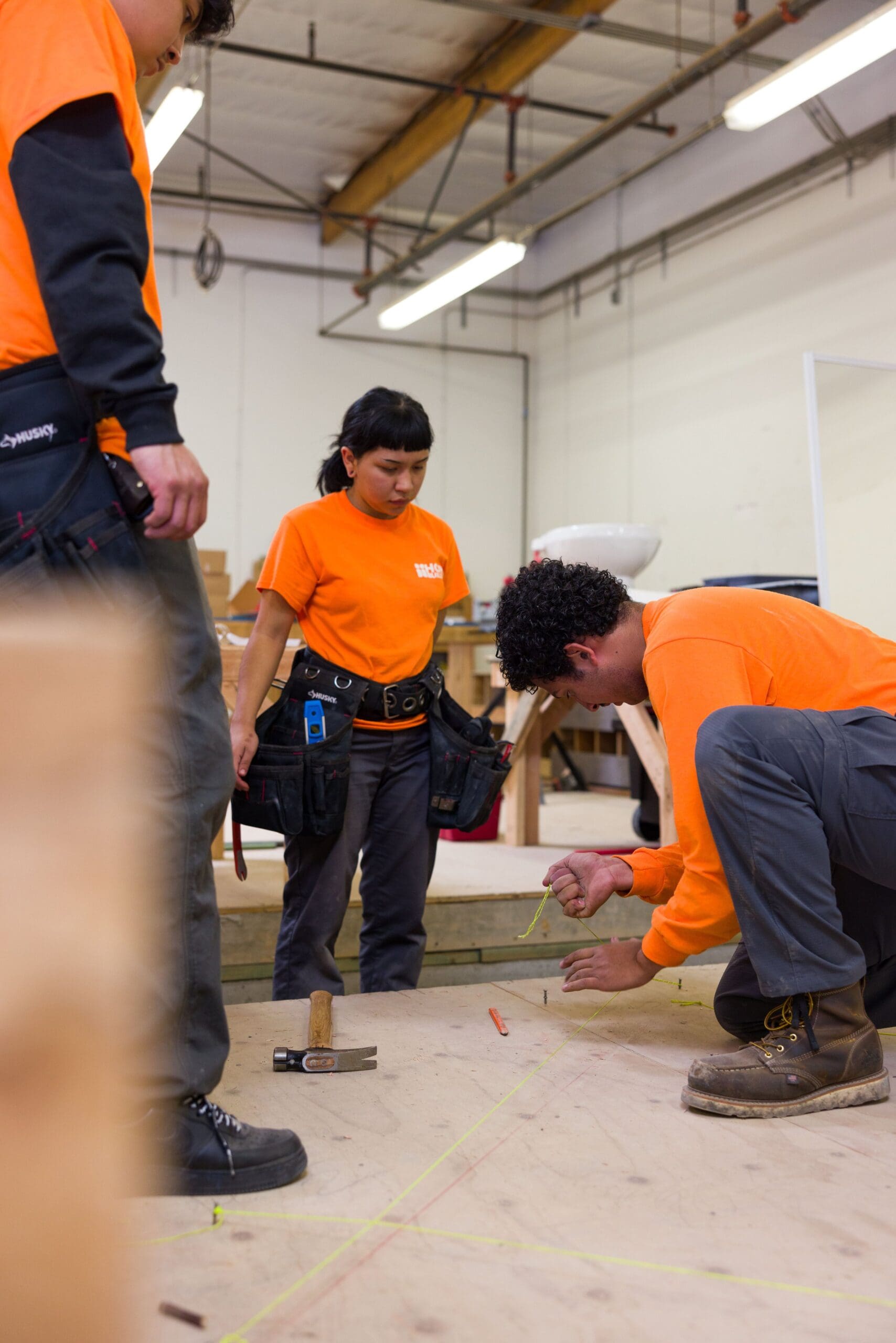There are certainly employers across the country focused on creating inclusive workplaces, and entrepreneurial organizations like members of the Young Adult Talent Development Network are seeking partnerships to elevate the practices they implement and connect young people to quality job opportunities. Young adult talent developers must support the next generation of talent by advocating for equitable workforce cultures. Only through collective effort and commitment from all stakeholders can real progress be made in addressing and dismantling bias in the workplace.

Dismantling Racial and Gender Bias in the Workplace
October 6, 2023
In this blog, JFF shares the experiences and advice of young adults and talent developers.
I was considered a diversity token for the company. They did a lot of buttering up during the initial interview and acting like they were interested in my skill set, but they were more interested in my skin color and basically putting a Black woman in a chair, putting my picture on their website, and giving themselves a diversity pat on the back.
Sierra Bentley
Sierra Bentley and Katie Alavez are both alumnae of training programs designed to help young people who face barriers in the labor market enter and navigate their career fields of choice. Bentley, who also goes by her last name at work, a tactic she began to overcome biased hiring practices when breaking into the tech industry, is in the early stage of her career; Alavez is an electrician apprentice and student. Both Alavez and Bentley have developed the skills and networks needed to access and advance in high-demand fields. Without a doubt, both have bright futures ahead of them, and both share optimistic outlooks on life even as they manage sometimes-challenging work experiences.
Despite entering two different industries, Alavez and Bentley share another unexpected but all too real similarity in their early career experiences. Each has encountered and been forced to confront racial and gender bias at work. During a recent meeting of the Jobs for the Future (JFF) Young Adult Talent Development Network, Bentley and Alavez shared their experiences and advice for practitioners and employers focused on improving early-career experiences for young adults.
Bentley’s aspiration to work in tech began in high school. However, after her school counselor discouraged her interest and several postsecondary programs failed to meet her needs, Bentley found it difficult to identify a path to break into the industry. She moved closer to her dream when she discovered NPower, a national tech training nonprofit that provides skills training, certifications, and the network-building needed to enter IT occupations. NPower and its IT fundamentals program offered everything Bentley had been looking for.
 Sierra Bentley is an NPower Alum and currently works as a Lead IT Specialist.
Sierra Bentley is an NPower Alum and currently works as a Lead IT Specialist.
Bentley documented her career journey on LinkedIn, sharing both the lows and the highs leading up to landing her first industry role. Her sense of joy and accomplishment from finally working in IT quickly diminished when, within two weeks of joining her first company (and before connecting with NPower), she realized it was not her skill set the company valued. “I was considered a diversity token for the company. They did a lot of buttering up during the initial interview and acting like they were interested in my skill set, but they were more interested in my skin color and basically putting a Black woman in a chair, putting my picture on their website, and giving themselves a diversity pat on the back.”
While continuing to document her journey on LinkedIn, Bentley discovered through her social media engagement that she was not alone in her experience—tech has been a difficult space for people of color and women to enter and persist in. As workforce data show, tech workers are most likely to be white and male. In 2021, workers who identify as women filled 26.2% of computer and mathematical occupations, an increase of only 1.2 percentage points in the last decade. Also in 2021, 65.4% of computer and mathematical workers were white.
A recent survey by NPower found that 75% of Americans don’t believe U.S. companies are following through on their diversity, equity, and inclusion commitments made during the pandemic, nor do respondents think businesses are doing enough to employ underrepresented women of color. NPower’s Diversity Directive offers a dynamic set of resources to help build inclusive and more diverse tech and tech-adjacent companies that will recruit, hire, and retain women of color pursuing tech careers through nontraditional pathways.
Microaggressions on the Job
Alavez’s pathway to her current role as an apprentice began at Hope Builders, where she completed a three-month program in general construction, including career readiness training. Upon entering the construction industry, also a field predominately made up of white and male workers, she found that bias manifested as divisions of labor—the way tasks are assigned—as well as framing racist, sexist, and ableist comments made at worksites as jokes. These are all examples of the pervasive and nuanced nature of microaggressions in the workplace.
Alavez says microaggressions have professional and personal effects. “I believe the way [microaggression] affects the field is that it lowers morale, it can divide a team, and it can create an unsafe work environment, or at least the feeling of one. This can lead to a negative environment to work in.” Navigating a hostile work environment takes a toll outside the workplace. Alavez says she has taken the stress of work home, affecting interactions with her family. She has experienced feelings of paranoia due to an unsafe workplace.
Microaggressions are subtle but often hurtful remarks, actions, or behaviors that convey prejudice or bias toward individuals from groups historically and systemically denied opportunities and power. Microaggressions can be intentional or unintentional and are often based on stereotypes and assumptions. These actions may seem small, but they can have a significant impact on individuals, leading to feelings of discomfort, exclusion, and even trauma..
You deserve respect; it’s one of your rights in the workplace.
Katie Alavez
Despite the personal impact she has experienced, Alavez tries to react to bias with compassion and gives others the respect she hopes to receive. “Sometimes you may be receiving the wrong message and the reaction. [I try to have] compassion for someone not knowing better.” Still, she advises confronting situations of bias head-on when you feel safe to do so and having conversations that explore experiences. “Lived experiences will affect my peers’ point of view, and when you take that time [to explore experiences], you may be better able to form relationships and identify allies.” Alavez emphasized the value of assertiveness: “You have to respectfully demand respect. You deserve respect; it’s one of your rights in the workplace.”
Having shared their experiences confronting racial bias at work, Bentley and Alavez offered additional advice to the field of talent developers who work with young adults facing barriers in the labor market:
- Provide mock interviews plus scenario training: Many training programs include mock interviews to help young people prepare for and gain comfort with the types of questions potential employers may ask. Bentley noted that in addition to this vital form of readiness training, practitioners should also build awareness of how biases such as microaggressions can present and provide examples of ways to respond to racial bias. Bentley, who noted that she never encountered racial bias until her first career experience, emphasized, “It can be a shock when a microaggression comes your way and you don’t know how to answer. But make sure students and the people that you’re working with are aware of it, that it [racial bias] is out there, and just giving different approaches to come by it. Also, make sure they [young people] know when to walk away and when [staying] is not worth it.”
- Make soft skills training a focal point of curricula: For Alavez, Hope Builder’s career readiness curriculum provided preparation for situations she has encountered at work and the social-emotional tools that she calls on when confronting bias at work. “In soft skills training, [instructors] would pose the questions, ‘why is someone using that tone, and what does it imply?’ Now when I hear certain dialogue being used and words being used, it automatically raises a red flag, and it tells me to slow down and analyze the situation.” Time spent during technical and career training on understanding team dynamics and interpersonal relationships has enabled Alavez to know “when and how to fight battles” while being professional and direct when comments are made.
- Emphasize persistence in career journeys: Persistence is often necessary for career success. However, when encountering and confronting inequity and bias, young adults must consider and prepare for an added layer of emotional and mental readiness. From Bentley’s rebound from her first career experience, she found “good companies are looking for good people. It can be hard to find each other in the process, but learning that, especially for a tech journey, is called a journey for a reason. It may take some time, but don’t give up on these candidates, and don’t give up on the people you are working with.” Alavez also emphasized tenacity in overcoming obstacles and confronting biased points of view. “You cannot end racism overnight and in the whole world. But you can definitely keep trying. That’s all that matters.”
Soft skills are a form of employability skills that refer to a set of personal attributes, traits, and qualities that enable individuals to interact effectively with others and perform tasks. These skills are often nontechnical or nonspecific to a particular profession or industry and are essential in the workplace, as they help individuals collaborate with others, manage conflicts, and achieve common goals.
 Participants of Hope Builders engaged in the Construction training program
Participants of Hope Builders engaged in the Construction training program
Prioritizing Practices That Disrupt Intersectional Bias in the Workplace
While many young people entering early careers possess the resilience and determination to face bias and discrimination, leading talent development organizations, such as those in JFF’s Young Adult Talent Development Network, recognize they cannot fight this battle alone. Training programs play a critical role in supporting young adults, particularly young adults of color, with preparation for, entry to, and advancement along career pathways. Organizations that support better workforce outcomes for young adults can center the voices of people like Bentley and Alavez, who face discrimination and bias, and actively work with employers to create inclusive and equitable work environments.
Practitioners from national and community-based training organizations offered additional advice for advancing these calls to action among young adult talent developers:
- Identify and partner with mission-aligned employers: It is impossible to vet all employment spaces young adults enter; however, training providers should take every opportunity to lead due diligence when entering talent development and placement partnerships with companies. This could include meetings to identify alignment and the importance of diversity, equity, and inclusion within the company, meeting team members of color who have moved up in the company, and asking for data on attrition and promotion. Another proactive way to match with an inclusive workplace is creating early partnerships before employment that connect employers to young people and include them as partners in training.
- Create and advocate for safe spaces for discussion and feedback: Communicating the impact of microaggressions and implicit bias to allies and a supportive community was vital for Alavez and Bentley in navigating workplace challenges. In addition to providing coaching, training providers must incorporate youth voice and peer-to-peer feedback opportunities to build awareness of the experiences young people face. Offering program-based platforms for training alumni and workplace programs, such as employee resource groups that provide culturally aware affinity spaces for groups underrepresented in the industry, allows young people to build a community within organizations and access safe spaces to share their experiences and advocate for themselves.
Employee resource groups are voluntary, employee-led groups whose aim is to foster a diverse, inclusive workplace aligned with the organizations they serve.
Related Content

What's It Like to Have an Income Share Agreement? We Asked the Students.
May 30, 2023
To Cut Through the Noise of the ISA Debate, We Need Facts
June 4, 2021
Financing the Future
JFF’s Financing the Future initiative reimagines the way we finance education and skills development. Our Vision Jobs for the Future’s Financing the Future (FTF) initiative is working to reimagine financing for postsecondary education and skills…

New JFF Research Sheds Light on the Equity Impact of ISAs
April 14, 2022
We Must Act Now to Prevent the Next Student Debt Crisis
March 2, 2023
Income Share Agreements
An income share agreement (ISA) is an innovative financing tool used by education and training providers that ties the amount that learners pay to the amount of money they earn after completion. Students pay a…

How Biden’s Student Loan Plan Compares to Australian and U.K. Programs
April 5, 2023
How to 'De-Risk' Postsecondary Education in a Recession
September 20, 2022
The Regulatory Treatment of ISAs Just Got a Lot Clearer
November 17, 2022
A Growing Jobs Sector: Health Informatics
In a dynamic economic environment, those charged with developing the skills of the workforce must be able to assess labor market signals constantly using multiple sources of data and information. Credentials that Work utilizes innovations…

Policy & Advocacy
We are advancing evidence-based policy to enact changes in the education system and the workforce. Nearly half of U.S. workers are in low-paying jobs. Systemic issues in education, employment, and workforce development prevent millions of…